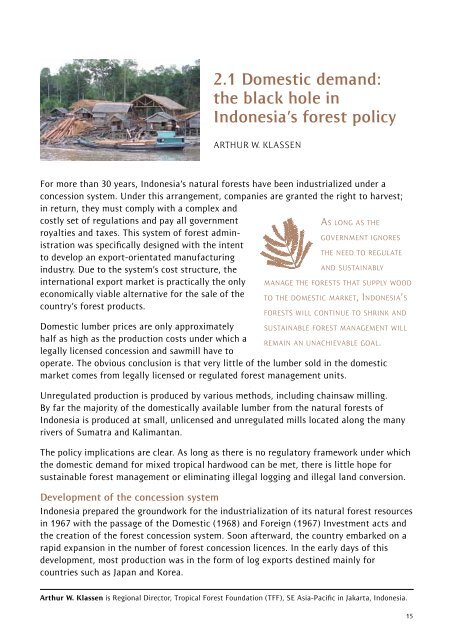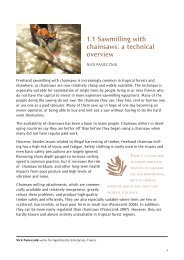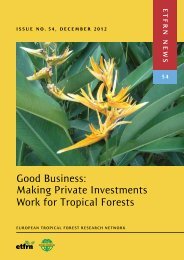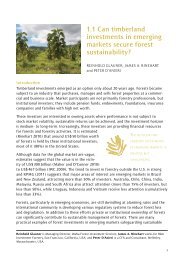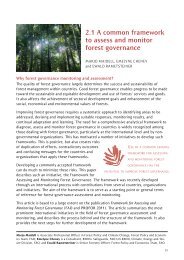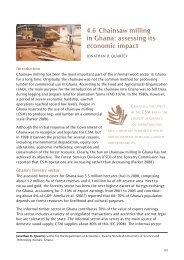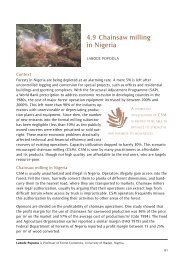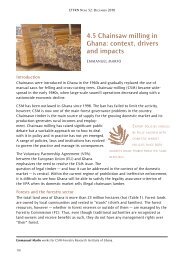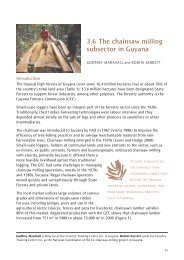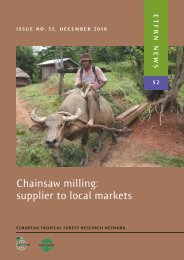Chainsaw milling: supplier to local markets - European Tropical ...
Chainsaw milling: supplier to local markets - European Tropical ...
Chainsaw milling: supplier to local markets - European Tropical ...
Create successful ePaper yourself
Turn your PDF publications into a flip-book with our unique Google optimized e-Paper software.
2.1 Domestic demand:<br />
the black hole in<br />
indonesia’s forest policy<br />
ARTHUR W. KLASSEN<br />
For more than 30 years, indonesia’s natural forests have been industrialized under a<br />
concession system. under this arrangement, companies are granted the right <strong>to</strong> harvest;<br />
in return, they must comply with a complex and<br />
costly set of regulations and pay all government<br />
as long as The<br />
royalties and taxes. This system of forest admin-<br />
governmenT ignores<br />
istration was specifically designed with the intent<br />
The need To regulaTe<br />
<strong>to</strong> develop an export-orientated manufacturing<br />
industry. Due <strong>to</strong> the system’s cost structure, the<br />
and susTainably<br />
international export market is practically the only<br />
economically viable alternative for the sale of the<br />
country’s forest products.<br />
manage The foresTs ThaT supply wood<br />
To The domesTic markeT, indonesia’s<br />
foresTs will conTinue To shrink and<br />
Domestic lumber prices are only approximately<br />
half as high as the production costs under which a<br />
remain an unachievable goal.<br />
legally licensed concession and sawmill have <strong>to</strong><br />
operate. The obvious conclusion is that very little of the lumber sold in the domestic<br />
market comes from legally licensed or regulated forest management units.<br />
susTainable foresT managemenT will<br />
unregulated production is produced by various methods, including chainsaw <strong>milling</strong>.<br />
by far the majority of the domestically available lumber from the natural forests of<br />
indonesia is produced at small, unlicensed and unregulated mills located along the many<br />
rivers of sumatra and kalimantan.<br />
The policy implications are clear. as long as there is no regula<strong>to</strong>ry framework under which<br />
the domestic demand for mixed tropical hardwood can be met, there is little hope for<br />
sustainable forest management or eliminating illegal logging and illegal land conversion.<br />
Development of the concession system<br />
indonesia prepared the groundwork for the industrialization of its natural forest resources<br />
in 1967 with the passage of the Domestic (1968) and Foreign (1967) investment acts and<br />
the creation of the forest concession system. soon afterward, the country embarked on a<br />
rapid expansion in the number of forest concession licences. in the early days of this<br />
development, most production was in the form of log exports destined mainly for<br />
countries such as Japan and korea.<br />
Arthur w. Klassen is regional Direc<strong>to</strong>r, <strong>Tropical</strong> Forest Foundation (TFF), sE asia-pacific in Jakarta, indonesia.<br />
15


